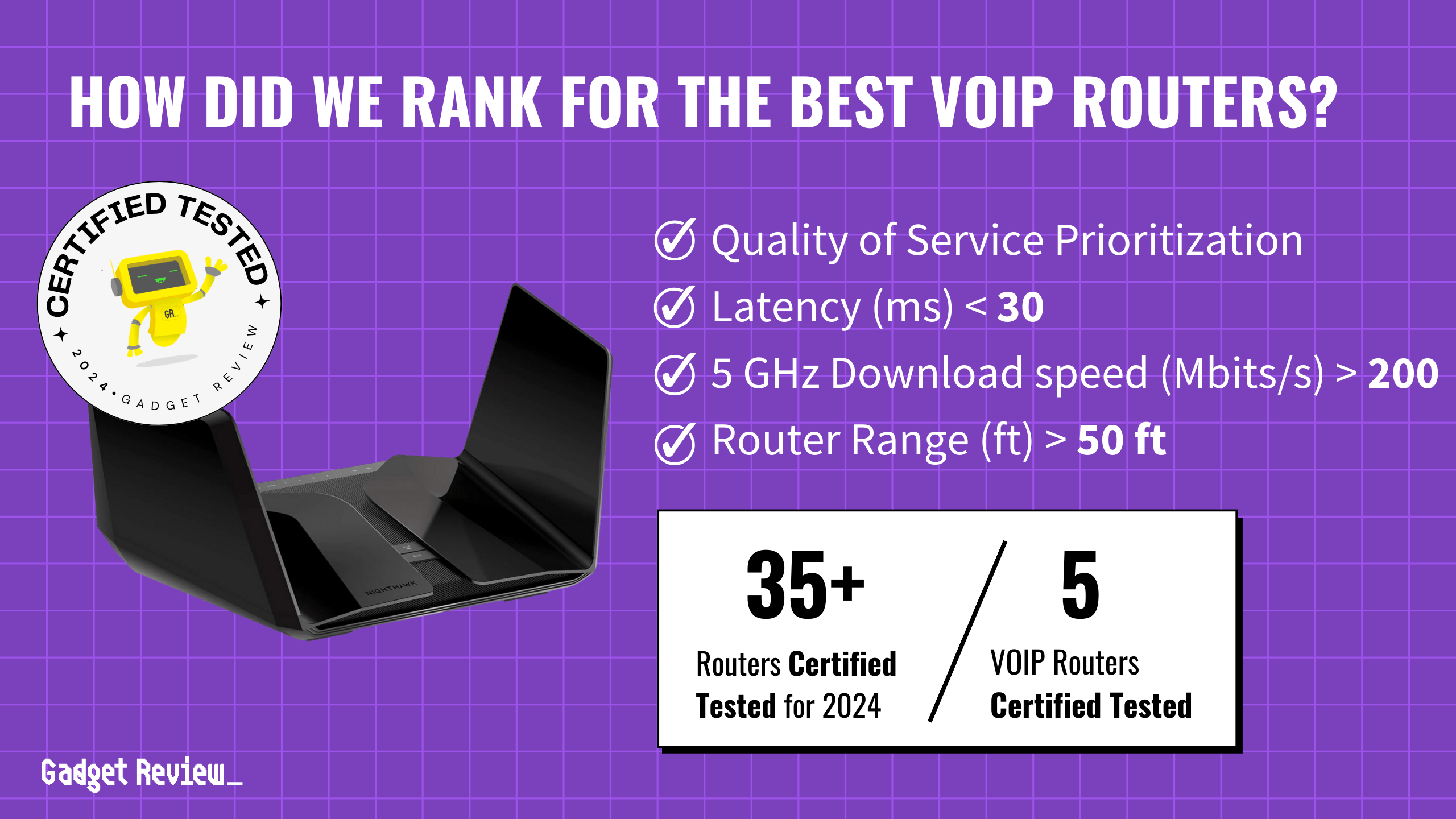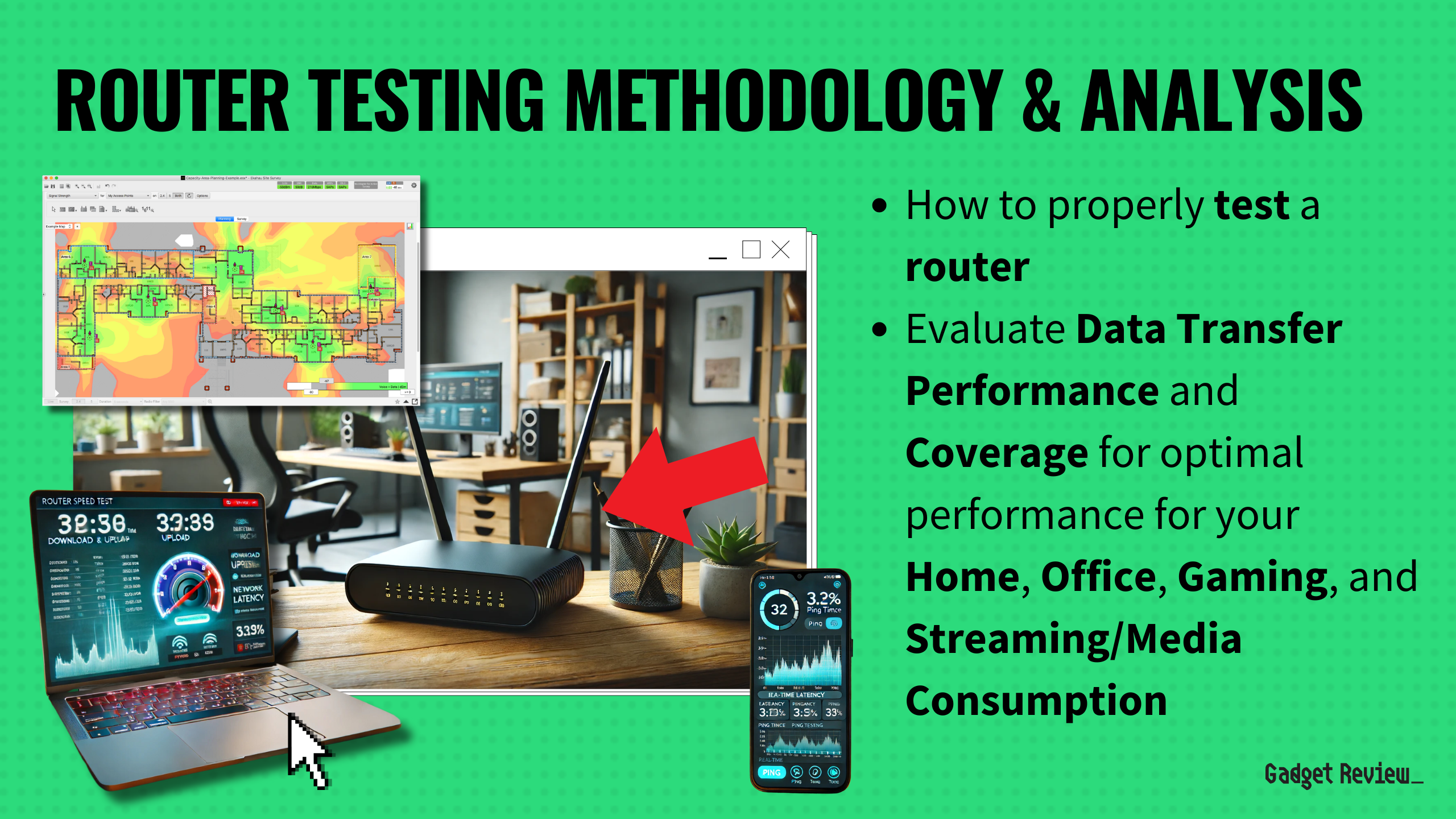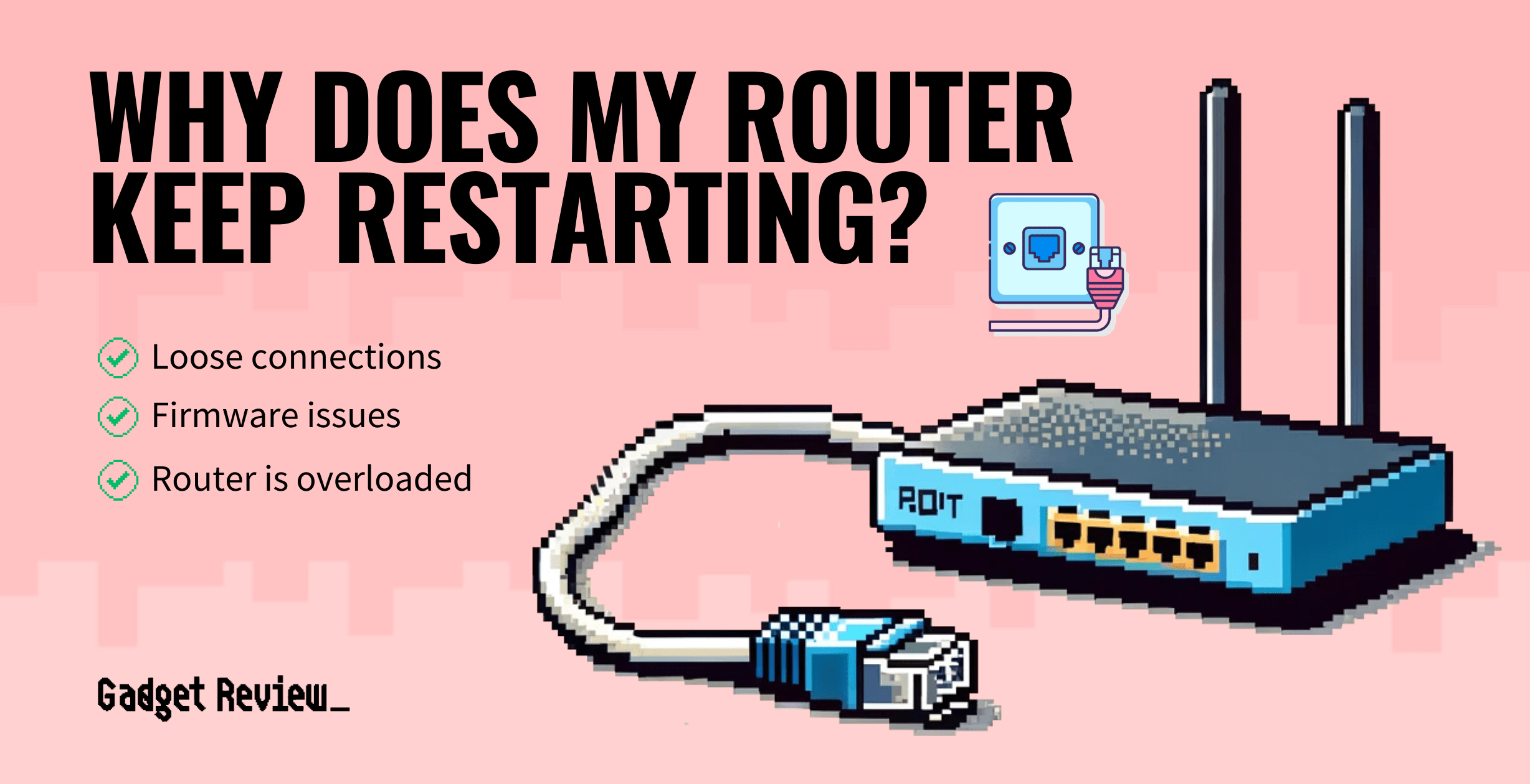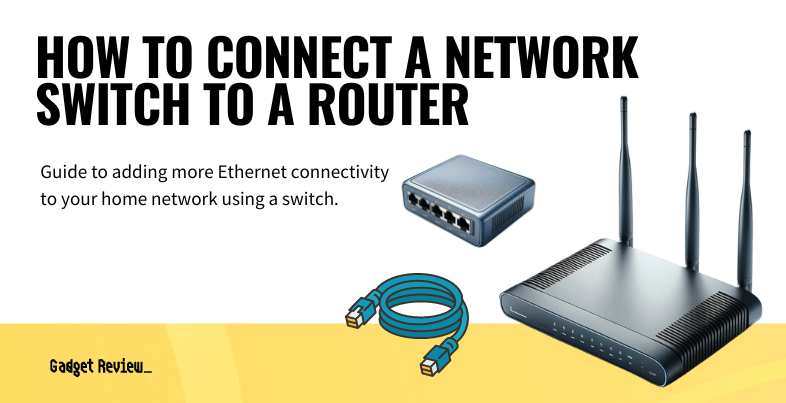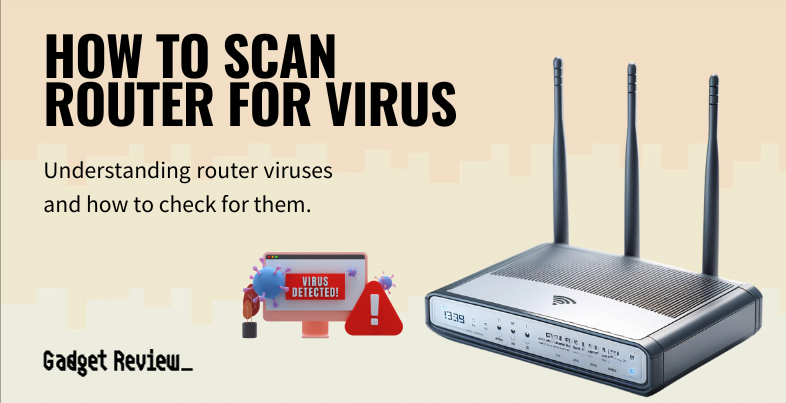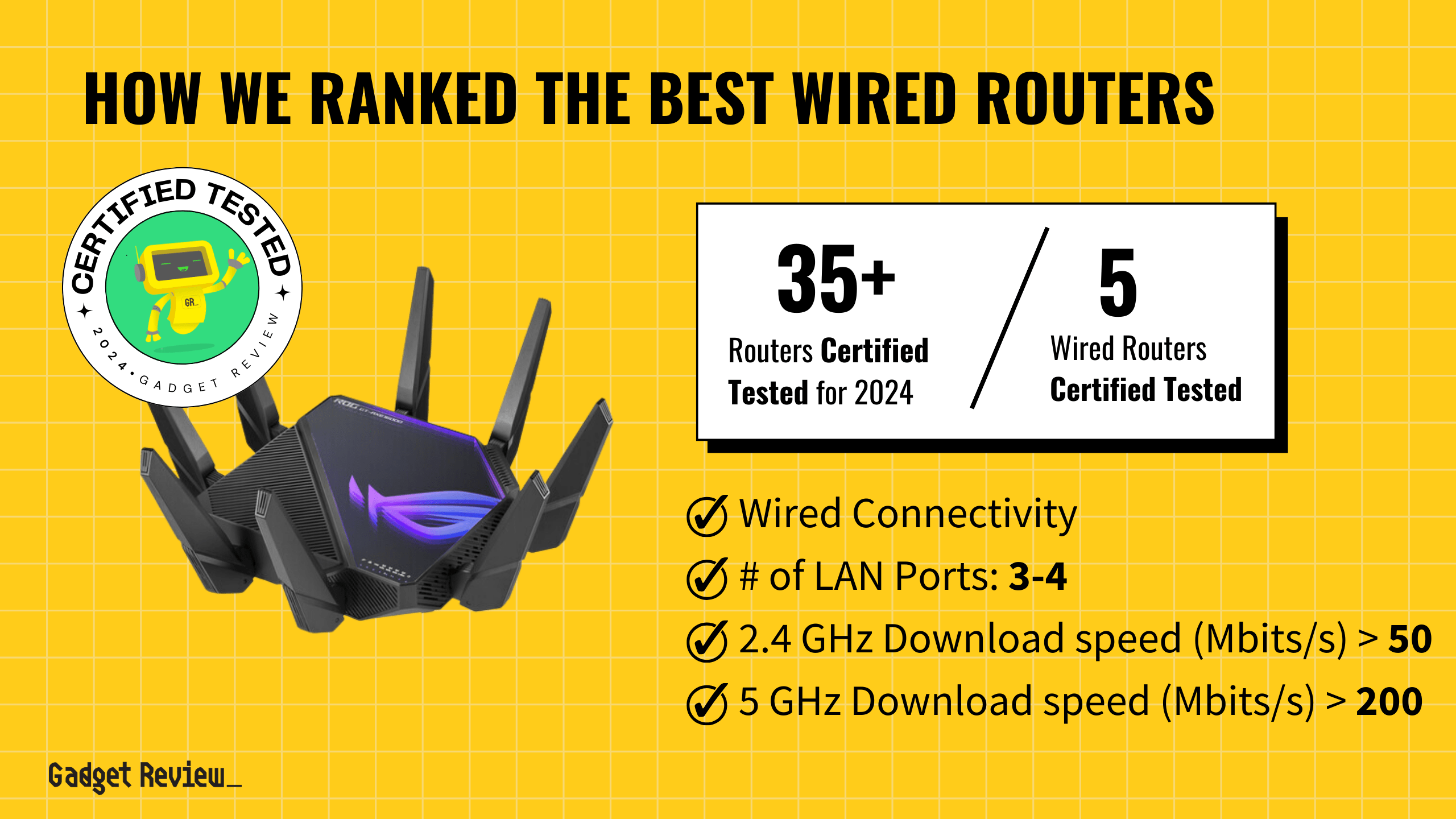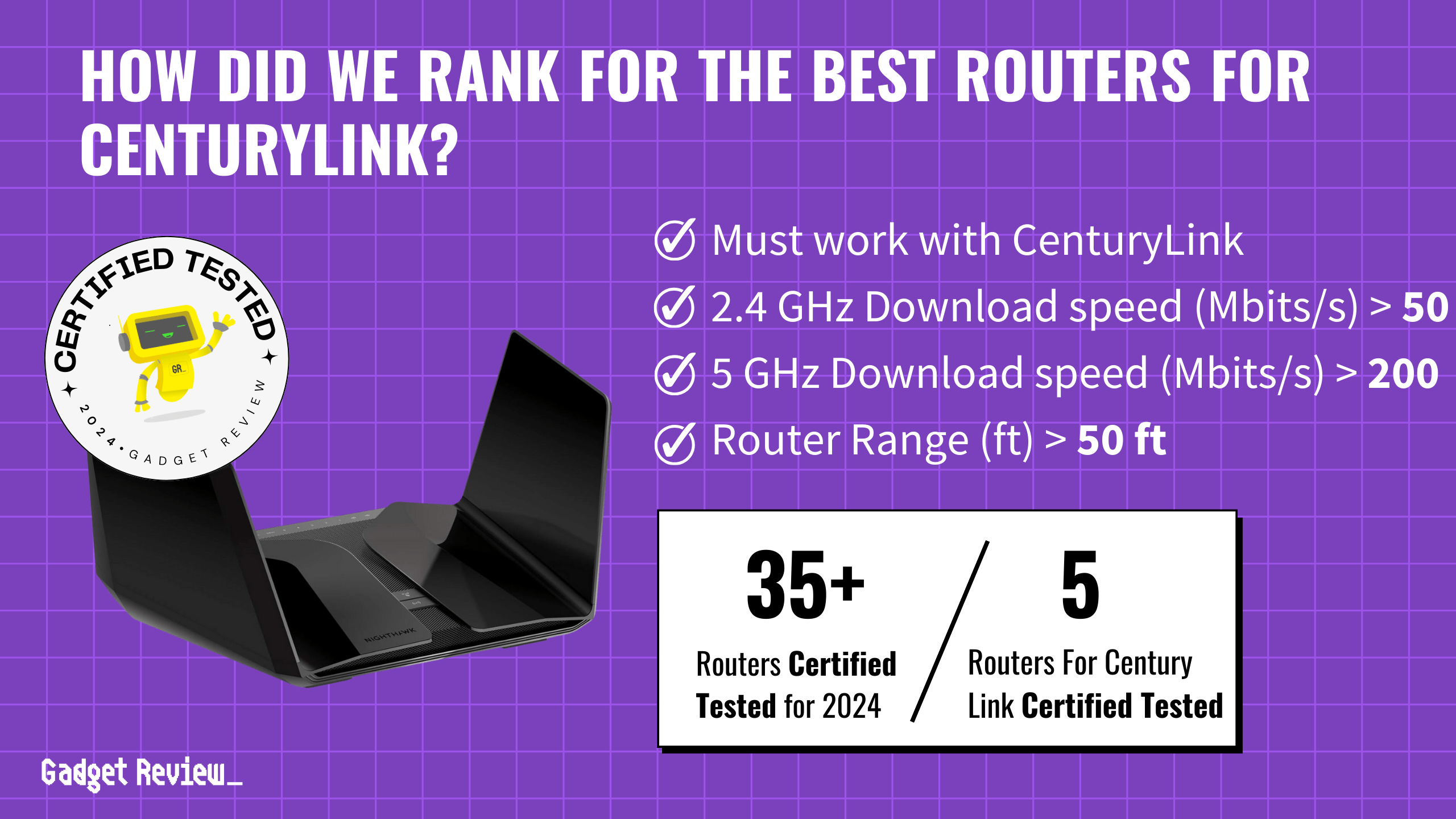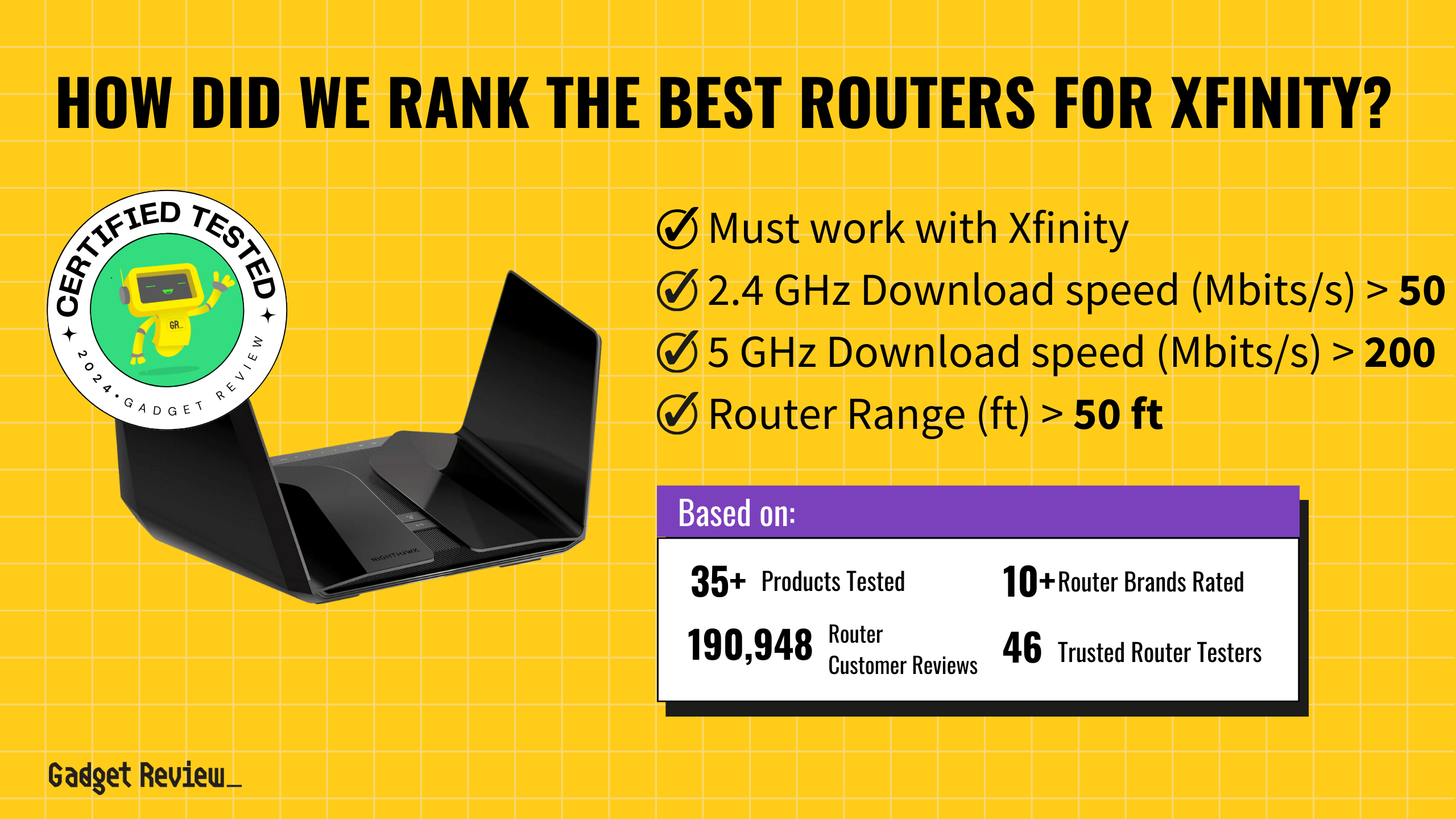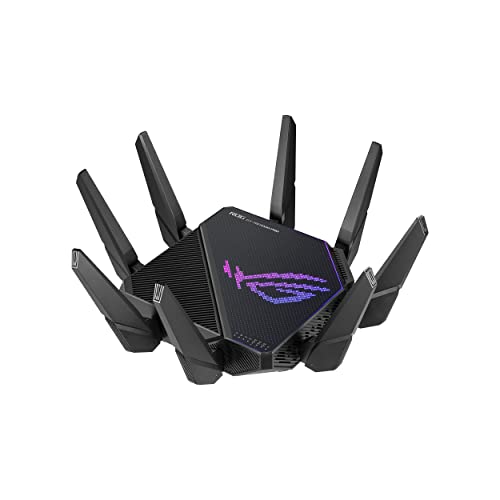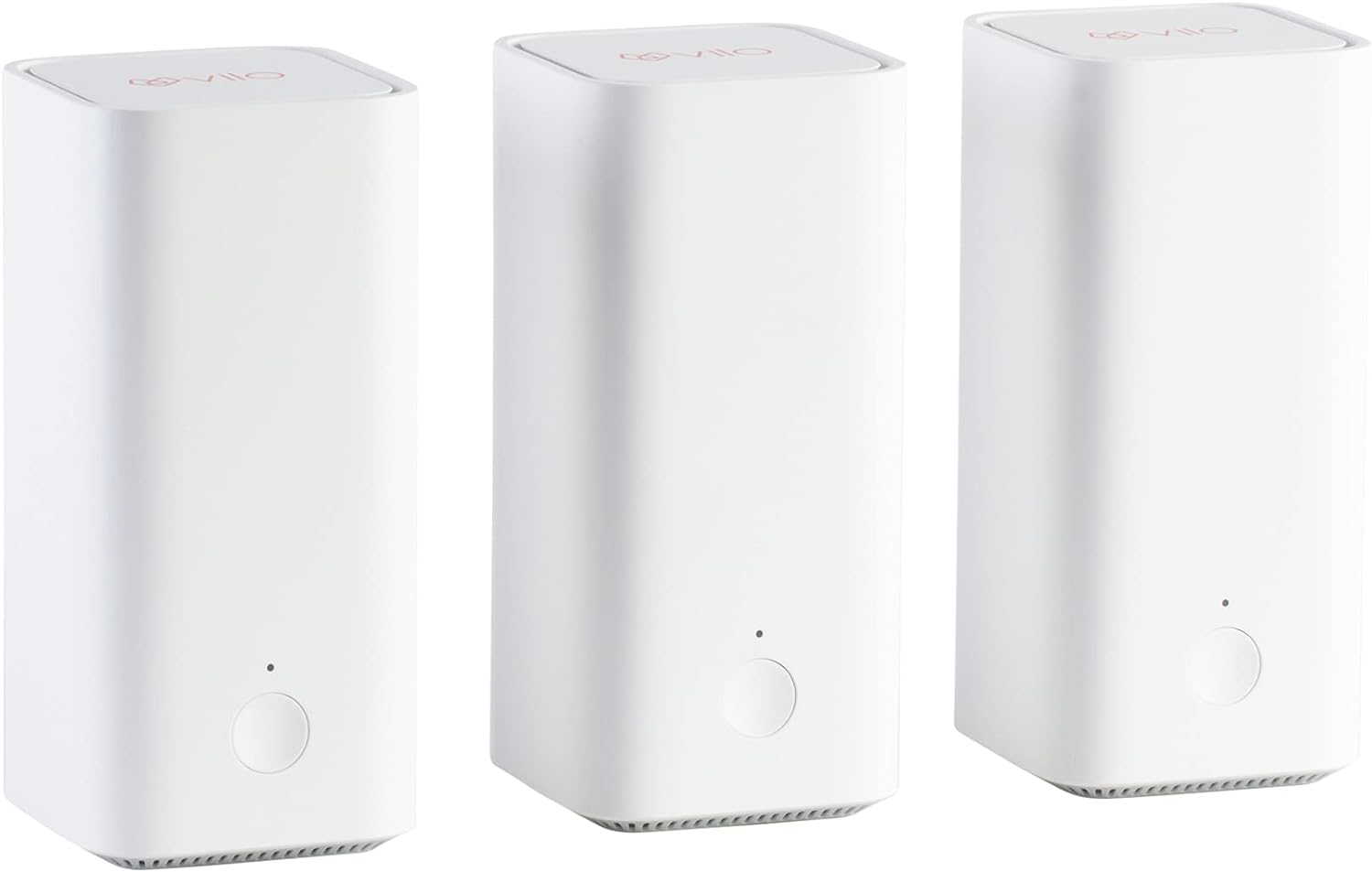When choosing the best VOIP router, key features to look for include Quality of Service (QoS) prioritization, which ensures smooth and clear voice calls by managing bandwidth allocation effectively. Optimal routers should have low latency and a 5 GHz download speed surpassing 200 Mbps.
Our guide identified five top-performing routers from a thorough evaluation of 37 models, backed by an analysis of 193,476 reviews. By using our AI-powered Trust Score, we filtered out untrustworthy and fake reviews, ensuring only the best made it to our list. These fantastic routers excelled in delivering consistent performance, making them ideal choices for both home and business use.
How Did We Rank the Best VOIP Router?
Our buying guide for the best VOIP routers is the result of a rigorous analysis of over 200 sites. By examining varied testing methods, evaluating expert reviews, and analyzing customer reviews, we identified 2 required test results, 1 nice-to-have test result, and 1 must-have specification. This ensures that the routers we recommend meet the highest standards for performance, reliability, and features essential for VOIP.
Our commitment to unbiased reviews is powered by our ‘True Score’ system, targeting low quality and fake reviews. When you shop through our links, you’re backing our mission. Dive deeper to see how.
Minimum Specifications
- Must have quality of service prioritization
Test Criteria
- Latency: A latency of 30 ms or less.
- 5 GHz Download Speed: A download speed on the 5 GHz band of at least 200 Mbits.
? “Nice To Haves”
- Router Range: A range of at least 50 feet before the signal from the router begins to become noticeably weaker.
Latest Updates
- 06/18/2024: Republished the list to include the best VOIP routers based on our True Score system.
Top Best VOIP Router For 2026
Prices accurate at the time of publishing

Best Overall

Runner Up

Best Value

Best Budget

Best Mid-Range

Premium Pick
TP-Link Archer GX-90
Best For Voip
For seamless VOIP, TP-Link Archer GX-90 delivers reliable, high-quality calls with prioritized traffic management and support for multiple devices.

True Score
83847Experts
908kCustomers
Absolutely Fresh
 SAVE $80$249.99$169.97
SAVE $80$249.99$169.97Read More
Snapshot
Reasons to Buy
- Ease of use
Reasons to Avoid
- Below average Wi-Fi speeds
- Middling Wi-Fi range
Specifications

# of LAN Ports 3 
Frequency Bands 2.4 GHz, 5.0 GHz, 6.0 GHz 
MU-MIMO Support Yes 
Wireless Standard AC, AX, N 
Mesh System Yes 
Quality of Service Prioritization Yes 
# of Phone Ports n/a 
# of WAN Ports 2 
App Compatible Yes 
Available Storage n/a 
Band Technology Tri 
Battery Charge Time – 
Data Encryption Type WPA3 
Energy Star Certified n/a 
Integrated Modem No 
LAN Port Speed – 
Number of Antennas 8 
Parental Controls Available 
Processor Cores Triple 
Processor Speed 1.7GHz 
WiFi Range 2500 sq.ft 
WiFi Speed 6.6 Gb 
Wired Speed Unknown All Specs
Test Results
2.4 GHz Download speed (Mbits/s) 75 5 GHz Download speed (Mbits/s) 280 6 Ghz Download speed (Mbits/s) 0 Latency (ms) 20 Router Range (ft) 40 2.4 GHz Upload speed (Mbits/s) 44 5 GHz Upload speed (Mbits/s) 163 6 Ghz Upload speed (Mbits/s) 0 All Tests
All Retailers
- $169.97$250Save $80
- $229.99
- $298.00
Our Verdict
If you don’t need a large wireless range, the TP-Link Archer GX-90 is a fantastic router for VOIP, providing reliable, high-quality voice calls across platforms. With download speeds reaching 75.39 Mbits/s on the 2.4 GHz band and 279.6 Mbits/s on the 5 GHz band, it ensures that VOIP calls are transmitted smoothly and without delay, a critical aspect for maintaining professional and clear voice interactions.
This router is no slouch for uploads either, with 5GHz speeds of up to 162.7 Mbits/s, although the Asus ROG GT6 Mesh offers mesh support and is quicker across the board if you need faster speeds, although at almost double the price. Additionally, the Archer GX-90 has Quality of Service (QoS) prioritization, which is pivotal in optimizing VOIP performance by intelligently managing bandwidth to prioritize voice traffic. This feature is indispensable for users who need voice communications to remain unaffected, even during peak network traffic, ensuring that every word is heard without interruption or lag.
Additionally, the inclusion of MU-MIMO technology allows multiple devices to engage in VOIP calls simultaneously without compromising the quality of the connection. This is especially beneficial in environments where numerous devices must maintain high-quality voice communication concurrently.
The TP-Link Archer GX-90 is a versatile router ideal for VOIP for smaller homes or offices, thanks to its strong 5 GHz performance and 40-foot range. With a low 20 ms latency, it ensures quick and clear voice interactions, making it perfect for personal and professional use. This router excels in VOIP applications with its fast speeds, QoS for prioritizing voice traffic, and MU-MIMO support, effectively meeting your needs.
Read Less

Best Overall

Runner Up

Best Value

Best Budget

Best Mid-Range

Premium Pick
Netgear Nighthawk RAXE500
Best For Gaming
For top-notch VOIP performance, the Netgear Nighthawk RAXE500 excels with its long-range connectivity and impressive speeds, ideal for crystal-clear voice calls.
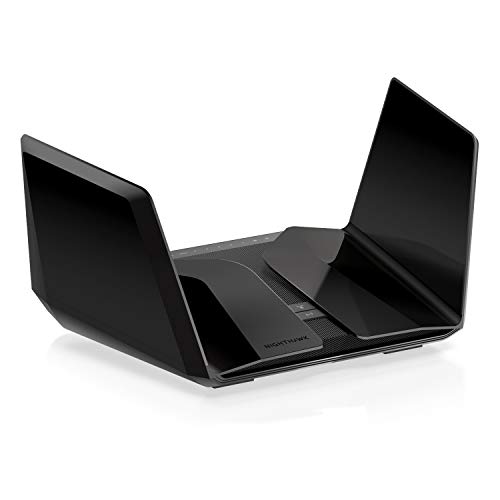
True Score
82837Experts
893kCustomers
Absolutely Fresh
 SAVE $329$599.99$270.99
SAVE $329$599.99$270.99Read More
Snapshot
Reasons to Buy
- Incredibly fast Wi-Fi speeds
- Reliable range
- Simple setup
Reasons to Avoid
- Limited 6GHz range
- Subscription-based parental controls
Specifications

# of LAN Ports 4 
Frequency Bands 2.4 GHz, 5.0 GHz, 6.0 GHz 
MU-MIMO Support Yes 
Wireless Standard AC, AX, N 
Mesh System No 
Quality of Service Prioritization Yes 
# of Phone Ports n/a 
# of WAN Ports 1 
App Compatible Yes 
Available Storage 512MB 
Band Technology Tri 
Data Encryption Type WPA3 
Energy Star Certified No 
Integrated Modem No 
LAN Port Speed 4 Gb Ethernet 
Number of Antennas 8 
Parental Controls n/a 
Processor Cores Quad 
Processor Speed 1.8GHz 
WiFi Range 3500 sq.ft 
WiFi Speed 10.8 Gb 
Wired Speed 1000 Mb All Specs
Test Results
2.4 GHz Download speed (Mbits/s) 417 5 GHz Download speed (Mbits/s) 844 6 Ghz Download speed (Mbits/s) 1,004 Latency (ms) 19 Router Range (ft) 105 2.4 GHz Upload speed (Mbits/s) 144 5 GHz Upload speed (Mbits/s) 317 6 Ghz Upload speed (Mbits/s) 557 All Tests
All Retailers
- $270.99$600Save $329
- $449.99$600Save $150
- $599.99
Our Verdict
If you want a premium router that excels in VOIP applications, the Netgear Nighthawk RAXE500 should be your go-to option, thanks to its impressive long-range connectivity and remarkable performance. It has a range of 105 feet without losing speed. Its 5 GHz band guarantees smooth voice calls at a download speed of 844.4 Mbits/s, while its 6 GHz band further amplifies VOIP quality, achieving speeds of 1004.1 Mbits/s and ensuring crystal-clear audio on a band uncompromised by other devices.
The Nighthawk RAXE500 is not just for the latest devices. It offers excellent support for devices that are limited to the 2.4 GHz band, with download speeds of 416.64 Mbits/s and upload speeds of 143.8 Mbits/s, surpassing all other models on our list. This is more than sufficient for high-quality VOIP communications. Whether you’re using a new or old device, this router ensures that all devices can achieve fast and efficient connections, which is vital for uninterrupted voice calls.
The Nighthawk RAXE500 boasts key features for optimal VOIP performance. Its Quality of Service (QoS) prioritization ensures VOIP traffic is prioritized, keeping voice communications clear and lag-free. Additionally, MU-MIMO technology supports multiple simultaneous VOIP calls, maintaining clarity even in high-traffic scenarios. With a low latency of 19ms, the router minimizes voice transmission delays, which is crucial for effective VOIP chats. Paired with strong encryption, it offers seamless and secure VOIP calls, safeguarding communication privacy.
The Netgear Nighthawk RAXE500’s extensive coverage, high performance across multiple bands, and advanced features like QoS and MU-MIMO support make it an ideal router for VOIP applications, ensuring clear, reliable, and secure voice communications across large spaces.
Read Less

Best Overall

Runner Up

Best Value

Best Budget

Best Mid-Range

Premium Pick
Asus RT-AX86S
Best For Long Range
For long-range VOIP on a budget, the Asus RT-AX86S shines with stable coverage and impressive speeds, ideal for uninterrupted calls.
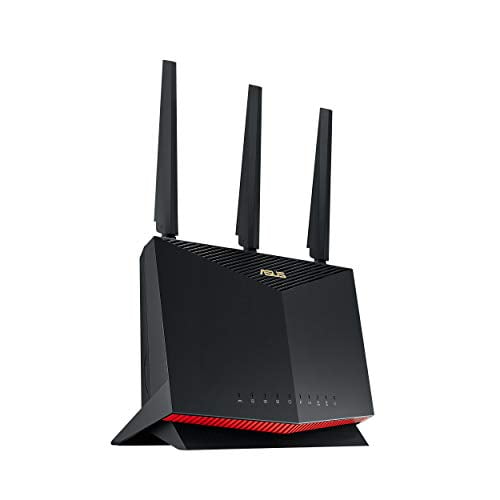
True Score
82823Experts
891kCustomers
Absolutely Fresh
 SAVE $23$225.00$202.24
SAVE $23$225.00$202.24Read More
Snapshot
Reasons to Buy
- Fast WiFi and download speeds
- Incredible range of coverage
- Easy installation and set up
- Low Latency
Reasons to Avoid
- Lacks Backhaul and Mesh Networking
Specifications

# of LAN Ports 4 
Frequency Bands 2.4 GHz, 5.0 GHz 
MU-MIMO Support Yes 
Wireless Standard AC, AX, N 
Mesh System No 
Quality of Service Prioritization Yes 
# of Phone Ports n/a 
# of WAN Ports 1 
App Compatible Yes 
Available Storage 256MB 
Band Technology Dual 
Data Encryption Type WPA, WPA-Enterprise, WPA2, WPA2-Enterprise, WPA3, WPA3-Enterprise, WPS 
Energy Star Certified No 
Integrated Modem No 
LAN Port Speed 4 Gb Ethernet 
Number of Antennas 4 
Parental Controls Yes 
Processor Cores Dual 
Processor Speed 1.8GHz 
WiFi Range 5400 sq. ft 
WiFi Speed 5.7 Gb 
Wired Speed – All Specs
Test Results
2.4 GHz Download speed (Mbits/s) 89 5 GHz Download speed (Mbits/s) 563 6 Ghz Download speed (Mbits/s) 0 Latency (ms) 15 Router Range (ft) 140 2.4 GHz Upload speed (Mbits/s) 0 5 GHz Upload speed (Mbits/s) 23 6 Ghz Upload speed (Mbits/s) 0 All Tests
All Retailers
- $202.24$225Save $23
Our Verdict
If you’re looking for a router offering long-range VOIP connectivity without breaking the bank, the Asus RT-AX86S is ideal. This budget-friendly router provides stable and extensive coverage up to 140 feet, essential for clear and uninterrupted VOIP calls across large spaces. With a 2.4 GHz download speed of 89 Mbits/s, it ensures reliable voice communication for devices located farther away or in areas with many obstructions, while the 5 GHz band offers a higher speed of 563 Mbits/s, perfect for ensuring high-quality VOIP calls without any lag or distortion.
The Asus RT-AX86S also impresses with an excellent 15 ms latency, only beaten by the 9 ms of the TP-Link Archer AXE75, contributing to the router’s ability to deliver uninterrupted and high-quality VOIP communications. Crucial features like Quality of Service (QoS) prioritization enhance the router’s capability for extensive range coverage. This feature allocates bandwidth efficiently to prioritize VOIP traffic, ensuring crystal-clear voice calls even during heavy network usage. MU-MIMO support further ensures that multiple VOIP calls can be easily handled simultaneously, maintaining high call quality across the board.
Moreover, with app compatibility for easy network management, users can fine-tune their settings to optimize VOIP performance, making the Asus RT-AX86S a smart choice for anyone needing dependable long-range VOIP connectivity on a budget. While it’s excellent for most VOIP needs, those requiring specialized features for larger applications might look at higher-end models. Nevertheless, this router offers excellent value and performance for broad VOIP coverage at an affordable price.
Read Less
Did you know 64% of router reviewers are untrustworthy?
Our research found only 46 of 127 router reviewers as of February 2026 can be trusted. This is why Gadget Review is committed to calculating the most accurate product scores on the web.
To do this, we give every router review site a Trust Rating, which measures how trustworthy the site and their testing claims are. We then leverage AI & a machine learning model to combine and calculate the Trust Rating with data from experts and consumers to deliver the True Score, the web’s most accurate product quality rating.
 193,476
193,476Router Reviews Analyzed

37
Total Products Analyzed

Best Overall

Runner Up

Best Value

Best Budget

Best Mid-Range

Premium Pick
Asus ROG GT6 Mesh
Best For Small Business
For handling multiple VOIP calls with clarity and reliability, choose the Asus ROG GT6 Mesh router, which offers impressive speeds and prioritization features.

True Score
80826Experts
864kCustomers
Absolutely Fresh
 SAVE $70$349.99$279.99
SAVE $70$349.99$279.99Read More
Snapshot
Reasons to Buy
- Fast Download/Upload Speed
- Easy to install and operate
Reasons to Avoid
- WiFi speed drops off at long range
- Connection range is limited
- Limited USB Connectivity
- Mediocre Latency
Specifications

# of LAN Ports 3 
Frequency Bands 2.4 GHz, 5.0 GHz 
MU-MIMO Support Yes 
Wireless Standard AC, AX, N 
Mesh System Yes 
Quality of Service Prioritization Yes 
# of Phone Ports n/a 
# of WAN Ports 1 
App Compatible Yes 
Available Storage 256MB 
Band Technology Tri 
Data Encryption Type WEP, WPA-Enterprise, WPA-PSK, WPA2-Enterprise, WPA3-Personal 
Energy Star Certified No 
Integrated Modem No 
LAN Port Speed 3 Gb Ethernet 
Number of Antennas 9 
Parental Controls Yes 
Processor Cores Triple 
Processor Speed 1.7GHz 
WiFi Range 5800 sq. ft 
WiFi Speed 2.6 Gb 
Wired Speed 2500 Mb All Specs
Test Results
2.4 GHz Download speed (Mbits/s) 139 5 GHz Download speed (Mbits/s) 701 6 Ghz Download speed (Mbits/s) 0 Latency (ms) 22 Router Range (ft) 95 2.4 GHz Upload speed (Mbits/s) 112 5 GHz Upload speed (Mbits/s) 619 6 Ghz Upload speed (Mbits/s) 0 All Tests
All Retailers
- $279.99$350Save $70
- $331.99$350Save $18
Our Verdict
If you’re looking for a router to handle multiple VOIP calls simultaneously, the Asus ROG GT6 Mesh router is an excellent choice. Its impressive 5 GHz speeds of 701.3 Mbits/s download and 618.5 Mbits/s upload ensure crystal-clear video calls and smooth online communication. With a 2.4 GHz speed of 139.35 Mbits/s, it supports everyday activities seamlessly, which is critical for operations like email and cloud services.
Its low latency of 22 ms enhances real-time voice interactions, making it perfect for applications requiring quick response times, such as VOIP and collaborative tools. In comparison, the TP-Link Archer AXE7 boasts an even lower latency of 9 ms, ensuring ultra-responsive performance. The Asus ROG GT6 Mesh’s mesh system support ensures comprehensive coverage, eliminating dead zones across large spaces or multiple floors, which is vital for maintaining consistent VOIP connections throughout the business premises.
The router’s quality of service (QoS) prioritization is a key feature of VOIP. It intelligently allocates bandwidth to prioritize voice traffic, ensuring high-priority communications like VOIP calls remain uninterrupted even during heavy network use. Combined with data encryption and MU-MIMO support, the Asus ROG GT6 Mesh secures calls against potential cyber threats and efficiently manages multiple concurrent connections, a necessity for businesses with a high volume of VOIP traffic.
The Asus ROG GT6 Mesh is a robust VOIP solution for small businesses. It offers high-speed, low-latency connections, extensive coverage, and advanced features designed to optimize and secure VOIP communications.
Read Less

DON’T SEE WHAT YOU’RE LOOKING FOR?
When setting up your network, choosing the best wired router can ensure reliable and fast connections, especially for devices that require consistent performance. The top Asus router is often recommended for its robust features and excellent build quality. For those with specific internet service providers, selecting the best router for CenturyLink or a great fiber optic router ensures compatibility and optimal performance.
For families, investing in a top-notch parental control router provides peace of mind by allowing you to manage and monitor your children’s internet usage. Gamers should learn how to set up a router for gaming to reduce lag and enhance their online gaming experience, ensuring a smooth and responsive connection.

Best Overall

Runner Up

Best Value

Best Budget

Best Mid-Range

Premium Pick
TP-Link Archer AXE75
Best For Mesh
The TP-Link Archer AXE75 excels at high speeds, low latency, and robust security features, making it a budget-friendly, VOIP-focused networking option.
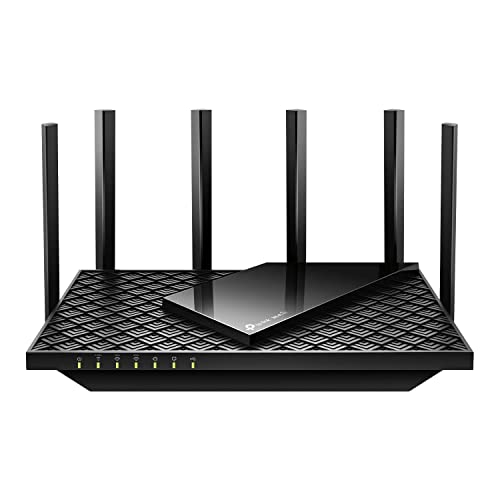
True Score
79804Experts
862kCustomers
Mixed Reviews
 SAVE $67$179.99$112.99
SAVE $67$179.99$112.99Read More
Snapshot
Reasons to Buy
- Good WiFi speeds
- Adequate range
- Simple set up
Reasons to Avoid
- Average download speeds
- Limited coverage
- Subscription-based security solutions
Specifications

# of LAN Ports 4 
Frequency Bands 2.4 GHz, 5.0 GHz, 6.0 GHz 
MU-MIMO Support Yes 
Wireless Standard AC, AX 
Mesh System Yes 
Quality of Service Prioritization Yes 
# of Phone Ports n/a 
# of WAN Ports 1 
App Compatible Yes 
Available Storage n/a 
Band Technology Tri 
Data Encryption Type WPA3 
Energy Star Certified n/a 
Integrated Modem No 
LAN Port Speed Gigabit Ethernet 
Number of Antennas 6 
Parental Controls Yes 
Processor Cores Triple 
Processor Speed 1.7GHz 
WiFi Range 2500 sq.ft 
WiFi Speed 2.4GHz 
Wired Speed 1000 Mb All Specs
Test Results
2.4 GHz Download speed (Mbits/s) 65 5 GHz Download speed (Mbits/s) 309 6 Ghz Download speed (Mbits/s) 318 Latency (ms) 9 Router Range (ft) 60 2.4 GHz Upload speed (Mbits/s) 0 5 GHz Upload speed (Mbits/s) 0 6 Ghz Upload speed (Mbits/s) 0 All Tests
All Retailers
- $112.99$180Save $67
- $126.99$159Save $32
Our Verdict
If you’re looking for a budget-friendly tri-band router, the TP-Link Archer AXE75 stands out as ideal for those who rely heavily on VOIP communications. With download speeds of 65.05 Mbits/s on the 2.4 GHz band, 309.1 Mbits/s on the 5 GHz band, and 317.9 Mbits/s on the newer 6 GHz band, it offers ample bandwidth for high-quality VOIP calls. Its exceptionally low latency of just 9 ms ensures that voice communications are clear and virtually lag-free, a critical feature for seamless VOIP interactions with a range of up to 60 feet.
In contrast, the Asus RT-AX86S, another budget-friendly option, offers a longer router range of 140 feet but has a slightly higher latency of 15 ms, which could impact the clarity of VOIP calls in real-time communication scenarios. Enhanced by advanced data encryption, the Archer AXE75 provides the level of security that small businesses need to safeguard their VOIP calls and sensitive data, ensuring client confidentiality and data protection. The router’s Quality of Service (QoS) prioritization is particularly beneficial for VOIP, as it intelligently allocates bandwidth to prioritize voice traffic, guaranteeing that VOIP calls remain uninterrupted, even during times of heavy network usage.
Furthermore, the router’s compatibility with various management apps simplifies network setup and maintenance, while its MU-MIMO technology supports multiple simultaneous device connections, maintaining high-quality VOIP calls without compromising speed or reliability. The TP-Link Archer AXE75 offers a compelling combination of performance, security, and efficient bandwidth management at an affordable price, making it an excellent choice for those looking to optimize their VOIP communication infrastructure.
Read Less
Category Snapshot
Routers
- Total Brands/Products Tested
12 Brands, 37 Products
- Top 2 Brands
Netgear, Asus
- Price Range (Budget-Premium)
$45-$600
- Average True Score
79.42
- Important Test Criteria
Download & Upload Speed (bits/second)
Range (feet/meters)
- Most Trusted Testers

- Top Router Experts
- Typical Warranty
1 year
- Covered by Insurance
Yes – AKKO
Which Criteria Matters for Testing VOIP Router?
By focusing on these criteria (2 required, 1 nice to have), anyone can quickly and easily compare these routers and how they’ll perform. This helps you make an informed decision and purchase a router that will meet your needs.
| CRITERIA | RANGE | REQUIRED | DEFINITION |
|---|---|---|---|
| Latency | < 30 ms | Yes | The delay that is created by a signal being sent by the router and then received. |
| 5 GHz Download Speed | > 200 Mbits/s | Yes | The maximum speed that the router can reach when downloading on the 5 GHz band. |
| Router Range | > 50 ft | No (Nice to have) | How far a device can be from a router before the signal starts degrading. It is worth noting that 2.4 GHz reaches further than 5 GHz. |
Our Trusted Data Sources
We looked at 120+ router reviewers and found that 46 are trustworthy (60%+ Trust Rating). The three we have listed below are our most trusted for routers.
- James Morris – Kit Guru, LinkedIn
- Matt Spencer – TechGearLab, LinkedIn
- Brian Nadel – Tom’s Guide, MuckRack
Interested in a comprehensive analysis of our data sources? We’ve got you covered. Below, you’ll find a detailed list of every router review website we’ve identified, organized by their respective Trust Ratings from highest to lowest. But we didn’t stop there. We’ve meticulously reviewed each publication and verified the data by checking whether the authors have bio links to MuckRack or LinkedIn. We’re committed to not only checking the facts but ensuring their veracity.
Router Test Data & Results
Disclaimer:
Evaluating router performance is more than hardware analysis. While hardware tests are straightforward, the challenge lies in contextualizing the results within the limits of real-world usage. Routers operate under conditions that testers cannot fully standardize, including variations in Internet Service Providers (ISPs), network traffic congestion, discrepancies between advertised and actual internet speeds, and the physical layout of homes. These factors introduce a degree of unpredictability, making it hard to draw universal conclusions. As such, our router recommendations aim to provide useful general guidance, accommodating a wide range of home environments and internet setups.
1. Latency (ms)
Latency
< 30 ms
Acceptable range of performance
Definition: The time it takes for the router to send and then receive signals.
Units of Measurement: Milliseconds (ms)
Tools to Measure: Speed-checking software
Why It’s Important:
Latency is important to reduce delay when gaming and video conferencing.
On a router, latency refers to how long it takes for the router to send out and receive a signal. The longer it takes, the more delay there is between you sending and receiving data, which can introduce lag in video games and also makes video conferencing harder since the person you’re speaking with now has to contend with your delay and vice versa. If you’ve ever spent a call talking over someone because you don’t know they started talking a second ago, that’s latency.
For that reason, we recommend a latency below 30 ms. As low as you can get it is obviously preferable, but latency is another aspect of your internet connection that is hard to manage. Latency differs to every single place you connect to, and every ISP has its own latency they “add” because you have to connect to their service too. Latency creeps in from your ISP, from the site you’re requesting data from, from your router, and from your own onboard Wi-Fi antenna – and that’s just to name a few sources. If you’re gaming, you also have a delay introduced by your connection to game servers and the delay that exists on a hardware level when you input commands.
Latency (ms; lower is better; 0 = No Data)
2. 5 GHz Download Speed (Mbits/s)
The much faster 5 GHz band offers up much greater bandwidth and is much, much better at meeting high-speed demands. Streaming high-quality video, using streaming services, gaming, downloading large files and games – the 5 GHz band is what makes all of these activities quick and bearable. It reaches a lower range than the 2.4 GHz band, but it’s also much faster, so you’ll use it more, especially on newer devices that actually support the band.
Given how much you’ll be using this band, we recommend a speed of at least 200 Mbits/s to ensure you’re able to enjoy streaming and gaming on at least a few devices simultaneously. Any lower and you start to run into real bottleneck concerns, such as endless buffering, lagging, or drops in connection.
5 GHz Download Speed
> 200 Mbits/s
Acceptable range of performance
Definition: The top speed the router reaches downloading on the 5 GHz band.
Units of Measurement: Mbits/s (megabits per second)
Tools to Measure: Speed-checking software
Why It’s Important:
This band is used by most modern devices and offers greater speeds that enable activities like gaming and HD streaming on multiple devices.
5 GHz Download Speed (Mbits/s; higher is better; 0 = No Data)
3. Router Range (ft)
Router range is exactly what the name suggests: how far can you get from the router before you start experiencing issues with your connection? The complicating factor is the simple fact that range depends on the band you’re using. 2.4 GHz is a band that offers greater range, so it gives tests results that show a greater range than tests that use the 5 GHz band. In general, our research found most publications used the 5 GHz band, so our recommendations are based on that.
As such, we recommend your router have a range of at least 50 ft. This gives you a good “bubble” around the router that you can connect to, but it’s important to know that things like the walls in your home can cause issues. Thicker walls block more signal, thinner walls block less. Some materials will also do a better job than others will at stopping signal, so if you see a router with a range of 65 ft, know that it might not reach that far in your home. It could reach further – or not nearly as far. This is also why you get dead zones in your home – it’s a matter of geometry and materials.
Router Range
> 50 ft
Acceptable range of performance
Definition: The distance the router transmits reliable signal out to before performance and speed degrades.
Units of Measurement: Feet (ft)
Tools to Measure: Measuring Tape
Why It’s Important:
Range impacts how far you’ll get a reliable connection in your home, and whether you’ll need extenders or not.
Router Range (ft; higher is better; 0 = No Data)
Best Small Business Routers: Mistakes To Avoid
- Ignoring Scalability: Opting for a router that doesn’t scale with your business growth can lead to frequent upgrades and additional expenses down the line. Ensure the router can accommodate increasing network demands.
- Overlooking Security Features: Security breaches can be devastating for small businesses. Don’t compromise on robust security features such as firewall protection, VPN support, and intrusion detection/prevention systems.
- Not Considering Performance Needs: Assess your network’s performance requirements carefully. Choosing a router with insufficient throughput or lacking essential features like Quality of Service (QoS) can hinder productivity.
- Neglecting Compatibility: Ensure the router is compatible with your existing network infrastructure, including switches, access points, and other devices. Incompatibility issues can lead to connectivity issues and downtime.
The Best Small Business Routers Tests Compared
Product |
True Score
|
2.4 GHz D/L Speed
|
5 Ghz D/L Speed
|
Range
|
Latency
| |
|---|---|---|---|---|---|---|
| 83 |
|
|
|
| $169.97 $250 $80 |
| 82 |
|
|
|
| $270.99 $600 $329 |
| 82 |
|
|
|
| $202.24 $225 $23 |
| 80 |
|
|
|
| $279.99 $350 $70 |
| 79 |
|
|
|
| $112.99 $180 $67 |


